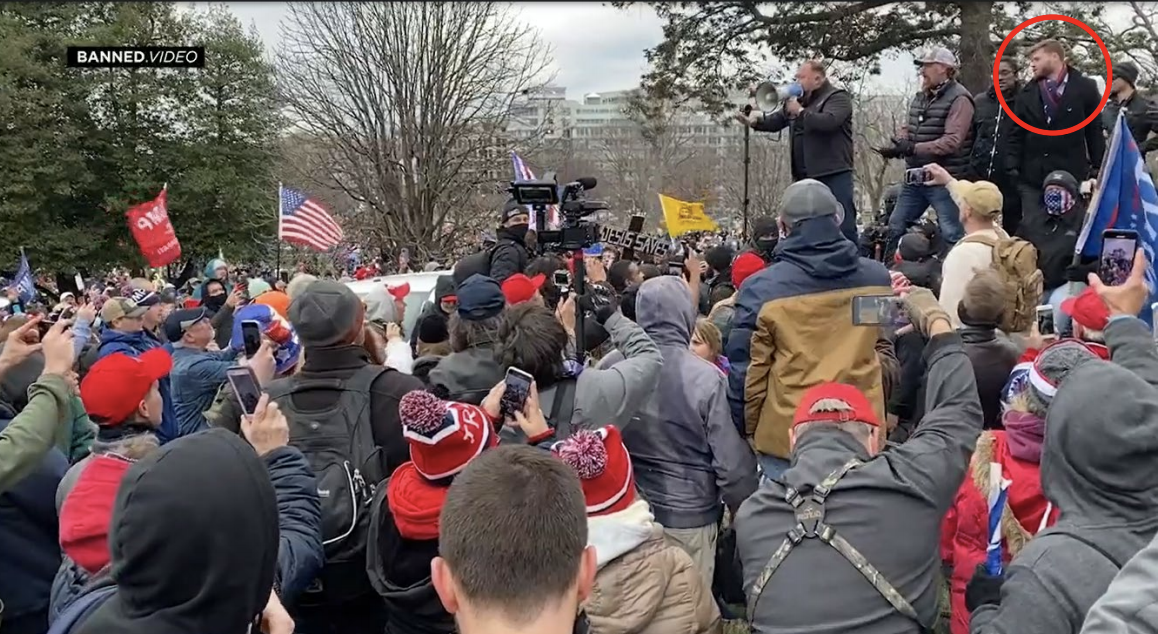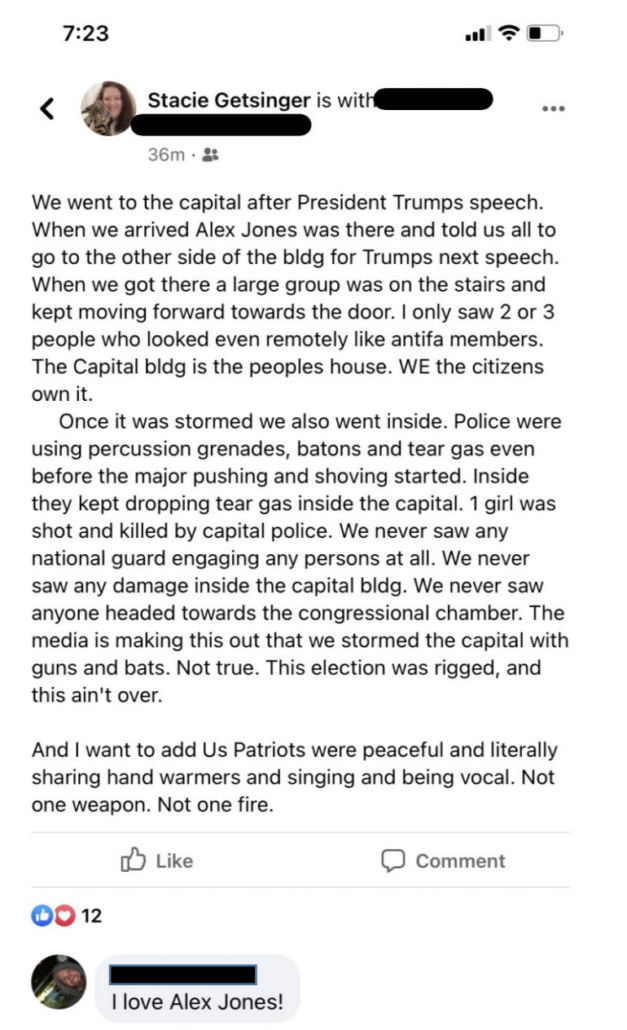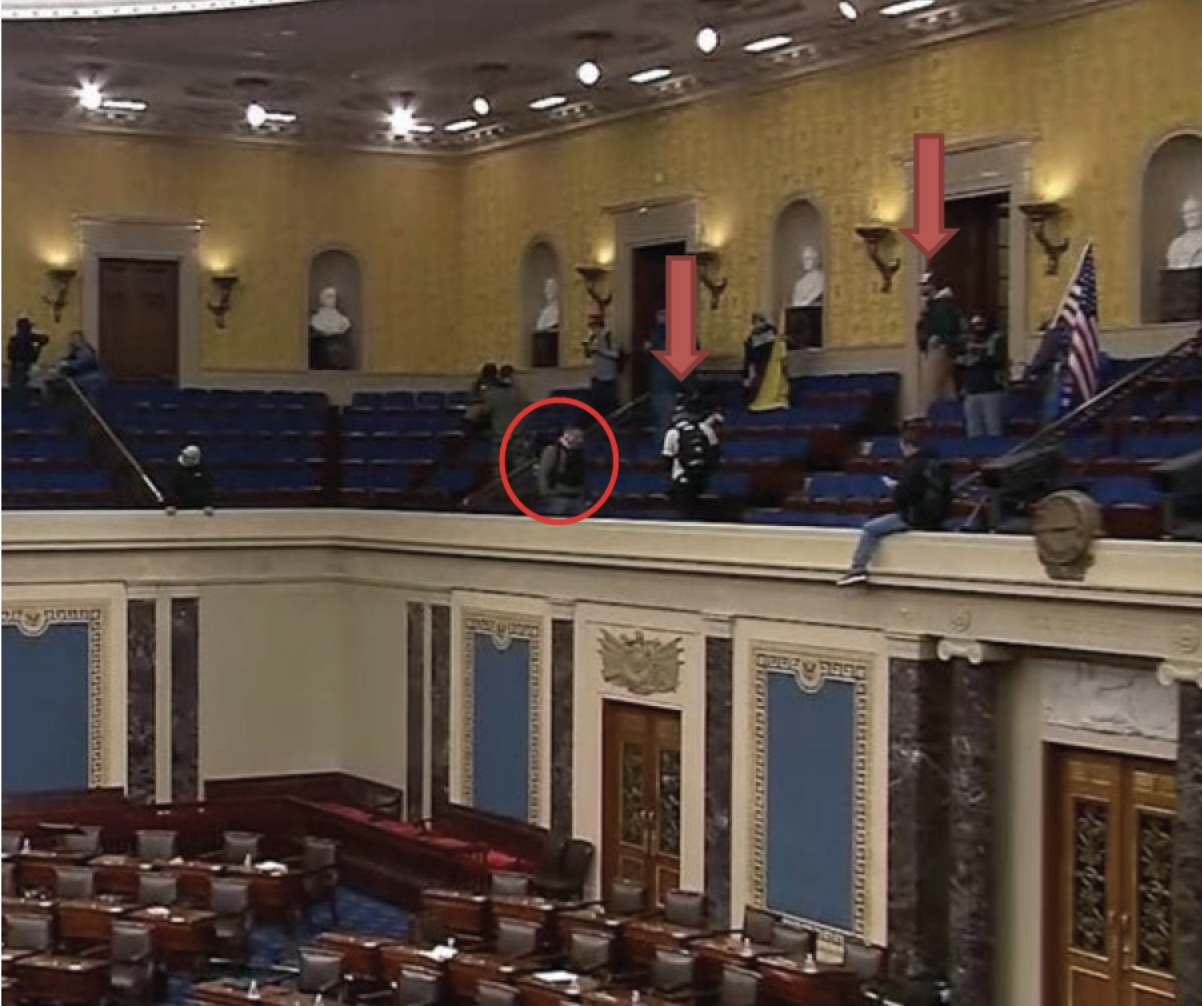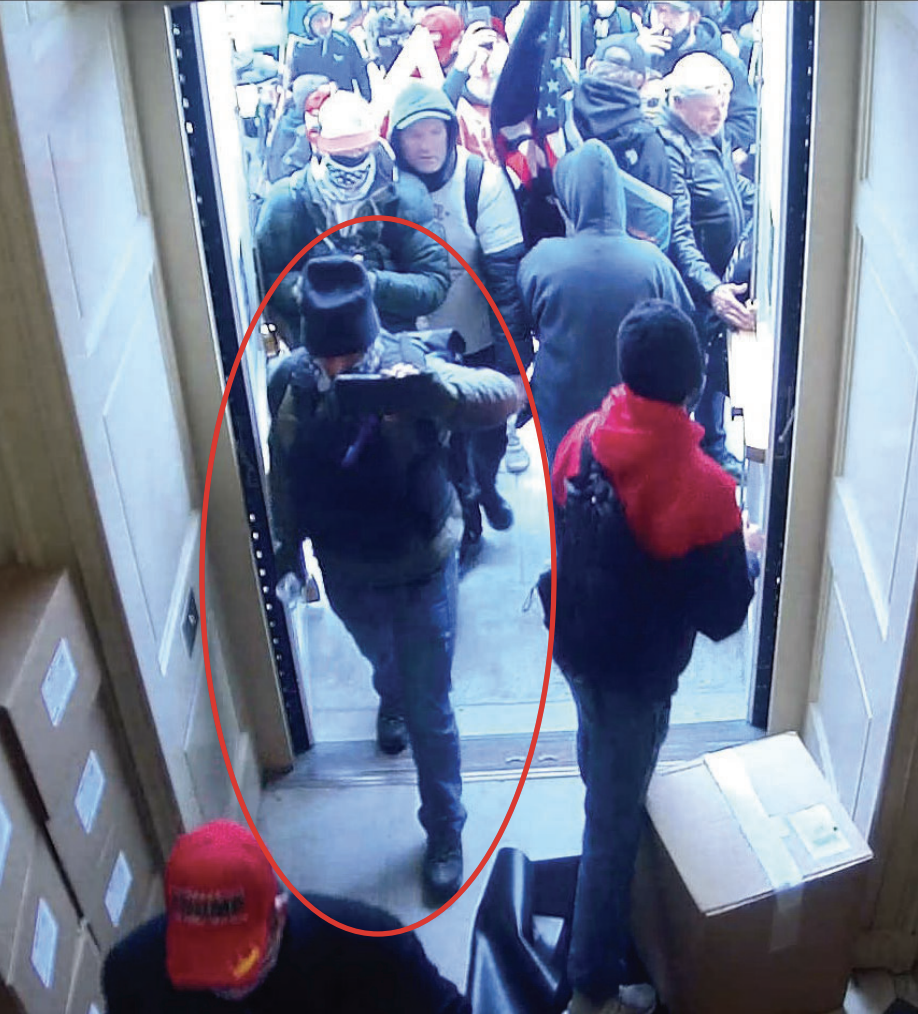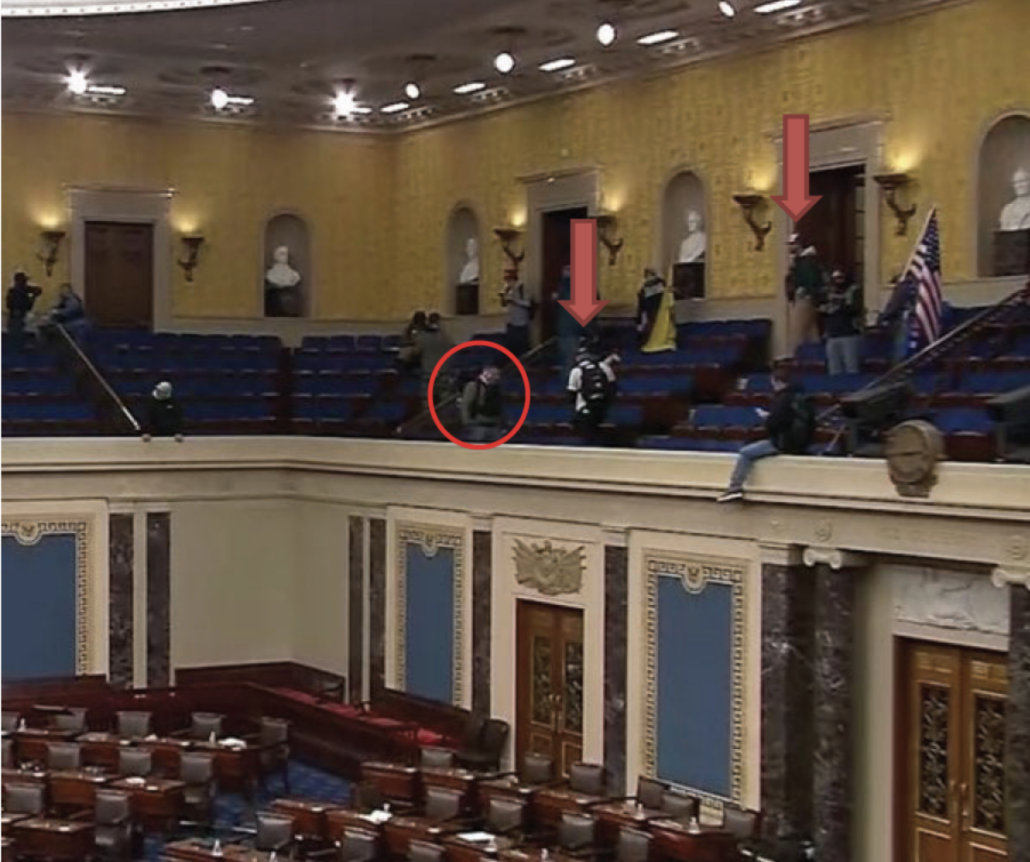Where to Look (or Not) for Signs of Life in Rule of Law
According to the court schedule for this week, January 6 defendants Stacie and John Getsinger will plead guilty on Thursday, no doubt to misdemeanor trespassing. On the surface, their guilty plea will likely resemble those of the dozens of other January 6 misdemeanor pleas that have gone before them, and that may be all it is.
But, along with a handful of others (Adam Johnson and Justin McAuliffe, who both pled guilty last week, are two other examples), these pleas may hint at what kind of larger underlying case DOJ is building. That’s because the Getsingers are witnesses to an important detail about the way January 6 worked: that Alex Jones, whom Trump had put in charge of leading mobs to the Capitol, likewise induced them to go to the top of the East steps of the Capitol with a lie, the false claim that Trump would be speaking there. That’s what led a couple like the Getsingers, who otherwise would never have entered the Capitol, to do so.
This comes even as InfoWars personality Owen Shroyer’s attempts to dodge his own legal accountability have brought more focus on Jones’ actions, described as Person One in DOJ’s opposition to Shroyer’s attempt to dismiss his indictment.
When the body-camera individual asked if he could get Person One there, the officer stated, “Through the hole that you guys breached right there” (emphasis added). When the body-camera individual responded that he didn’t breach anything, the officer retorted, “Well, the whole group that was with you guys.” The officer then pointed again away from the Capitol Building toward the northeast, telling them to leave through the same hole he had just said other rioters had breached. An officer surrounded by people illegally on the Capitol Grounds dismissively waving them away from the Capitol Building and toward another area hundreds of others had already illegally breached does not amount to “telling [the defendant] that … police officers could use his help.”
[snip]
[T]he defendant forced his way to the top of Capitol Building’s east steps with Person One and others and led hundreds of other rioters in multiple “USA!” and “1776!” chants with his megaphone. Harkening to the last time Americans overthrew their government in a revolution while standing on the Capitol steps where elected representatives are certifying a Presidential Election you disagree with does not qualify as deescalation.
[snip]
The video shows the defendant on an elevated platform leading chants with his megaphone on the Capitol Grounds before his first interaction with law enforcement officers; it shows the body-camera individual repeatedly (and unsuccessfully) try to get Person One on the Capitol steps; it shows evidence that the defendant reasonably should have known he was somewhere he was not supposed to be, including by stepping near moved barriers and downed signs; and it shows officers repeatedly refer to the defendant’s group as part of the problem and the “breaches” of various police lines. In fact, at the end of the video, the body-camera individual took matters into his own hands after facing multiple rejections for permission. He turned to the group and asked, “Just get him up there? … But we know we might catch a bang or two.” That is not evidence that the defendant received explicit or implicit permission to go onto the Capitol steps. That is evidence that the defendant is guilty of the crimes he is charged with.
Every single time that Merrick Garland has been asked about the scope of the January 6 investigation, he has said his DOJ will follow the evidence where it leads. These details are tidbits of the evidence in question, visible tidbits that would be largely meaningless unless you understood how the Oath Keepers, Joe Biggs, and his former employer all converged on those East doors just before they were opened from inside.
None of these details — and others like them, such as Johnson’s description of the crowd’s response to Rudy Giuliani and Mo Brooks’ calls for violence — guarantee that Rudy and Brooks will be held responsible.
At the rally, JOHNSON listened to several speeches, including by former President Trump, Rudy Giuliani, and an unknown older member of Congress–the latter of whom JOHNSON heard stating that it was time for action and violence. In response to these comments, JOHNSON saw members of the crowd nodding their heads in agreement.
But if you don’t know these details, you don’t know even what is publicly available about the investigation.
I respect David Rothkopf. I share his concerns about the threat Trump poses to US democracy and the limited time before Republicans likely take control of the House and shut down efforts to guard democracy in the US.
But unlike him I know that the place to learn about DOJ’s January 6 investigation is not by asking Harry Litman or Barb McQuade or AG Gill or Lawrence Tribe or even Dahlia Lithwick — all of whom I respect greatly — how they feel about the general direction of the investigation, but instead to look at the actual records or reading the reports of people actually covering hearings, such as this crucial Josh Gerstein story about how prosecutors responded when Judge Carl Nichols (the former Clarence Thomas clerk who happens to be presiding over Steve Bannon’s case) asked if someone who did what Trump did could be charged with the same obstruction charge DOJ is using with the more serious defendants.
At a hearing on Monday for defendant Garret Miller of Richardson, Texas, Nichols made the first move toward a Trump analogy by asking a prosecutor whether the obstruction statute could have been violated by someone who simply “called Vice President Pence to seek to have him adjudge the certification in a particular way.” The judge also asked the prosecutor to assume the person trying to persuade Pence had the “appropriate mens rea,” or guilty mind, to be responsible for a crime.
Nichols made no specific mention of Trump, who appointed him to the bench, but the then-president was publicly and privately pressuring Pence in the days before the fateful Jan. 6 tally to decline to certify Joe Biden’s victory. Trump also enlisted other allies, including attorney John Eastman, to lean on Pence.
An attorney with the Justice Department Criminal Division, James Pearce, initially seemed to dismiss the idea that merely lobbying Pence to refuse to recognize the electoral result would amount to the crime of obstructing or attempting to obstruct an official proceeding.
“I don’t see how that gets you that,” Pearce told the judge.
However, Pearce quickly added that it might well be a crime if the person reaching out to Pence knew the vice president had an obligation under the Constitution to recognize the result.
“If that person does that knowing it is not an available argument [and is] asking the vice president to do something the individual knows is wrongful … one of the definitions of ‘corruptly’ is trying to get someone to violate a legal duty,” Pearce said.
I can’t tell you whether DOJ will get much further up the chain of responsibility for January 6; part of that necessarily depends on DOJ’s success at obtaining cooperation, of which only that of Oath Keepers has DOJ thus far disclosed. I can’t tell you what DOJ is doing behind the scenes in what Garland describes as “following the money.”
But I can tell you that columns like Rothkopf’s, which complain that Garland’s DOJ is not doing enough to hold Trump accountable while ignoring cases like the Tom Barrack prosecution and the Rudy Giuliani investigation that provide concrete evidence about the kinds of investigative steps Garland’s DOJ has been willing to pursue (the Rudy raid was likely among Lisa Monaco’s first major decisions), likely don’t make it any more likely that Garland will be able to act against the masterminds of January 6 any sooner.
A far better use of Rothkopf’s time and space than bitching that Garland has authorized John Durham’s funding request, for example …
We have seen that Garland is letting the highly politicized investigation of special prosecutor John Durham into the conduct of the Trump-Russia investigation continue (by continuing its funding). We therefore have the real prospect that those who sought to look into the Trump-Russia ties that both Mueller and Congressional investigations have demonstrated were real, unprecedented and dangerous might be prosecuted while those who actively sought the help of a foreign enemy to win an election will not be.
… Would be to ask Harry Litman and Barb McQuade and AG Gill and Lawrence Tribe and Dahlia Lithwick about the specific things that Durham has done — like failing to cut-and-paste with fidelity, relying on a Twitter feed for a key factual assertion, and using materiality arguments to skirt DOJ’s prohibition on publicly commenting on uncharged conduct — that put his prosecutions in violation of DOJ guidelines. Such questions would be readily accessible to all by reading just two indictments (as compared to the full dockets of 675 charged January 6 defendants), it would draw on the considerable expertise of the prosecutors he cited, and it might do something concrete to give Garland the political support he would need to force Durham to hew to DOJ guidelines.
Importantly, it may not be possible for DOJ to move quickly enough against Trump without violating due process (just as one example, the Project Veritas investigation could lead to incredibly damaging revelations about political spying targeting the Biden family, but it’s not entirely clear DOJ respected First Amendment protections).
Which means those with a platform would be better off defending the rule of law — selling independents and moderate Republicans on the import of the January 6 investigation — than whining that it is not working quickly enough.
Update: In his piece, Rothkopf complains, as well, that the only visible investigation into the people around Trump is coming from the January 6 Commission, not DOJ.
More troubling to me though is that the only reason we are hearing of any case being brought against Bannon as a senior coup plotter (or upper middle management in any case) is because Congress is investigating the events of Jan. 6. We have not heard a peep out of the Department of Justice about prosecuting those responsible for inciting, planning or funding the effort to undo the lawful transfer of presidential power to the man the American people elected, Joe Biden.
This morning, Adam Schiff went on CNN. Dana Bash asked him about Judge Amit Mehta’s focus on Donald Trump’s role in the insurrection in a sentencing last week. In response, Schiff described that, “I am concerned that there does not appear to be an investigation, unless it’s being done very quietly” into Trump’s call to Brad Raffensperger to demand he come up with just enough votes for Trump to win the state. But Schiff noted that, “this is not January 6 related — specifically, at least, to the violence of that day.”
Then Bash asked whether Schiff was saying he wanted Biden’s DOJ to be more aggressive. Schiff did not answer “yes.” Instead, he responded to a question about DOJ by talking about the January 6 Commission’s role in holding people accountable.
We are now trying to expose the full facts of the former President’s misconduct, as well as those around him. It is certainly possible that what we reveal in our investigation will inform the Justice Department of other facts that they may not yet be aware of yet. And so we will pursue our role in this, which is to expose the malefactors, to bring about legislation as a result of our investigation, to protect the country. But we will count on the Justice Department to play its role.
That is, when Bash asked specifically if DOJ was being aggressive enough on January 6, Schiff implied that the January 6 Commission played a key role in their efforts.
This is something that has not gotten enough attention: Even if DOJ didn’t ask, the Jan 6 Commission would refer people for any crimes they discovered, as SSCI and HPSCI both referred people to Mueller for lying, lies that led to the prosecution and cooperation of (at least) Michael Cohen and Sam Patten. Schiff knows better than anyone that HPSCI’s investigation was critical to the prosecution of Roger Stone. I also suspect that Steve Bannon’s transcripts were important preparation for Bannon’s grand jury appearance in January 2019, because they laid out the script that the White House had given to him for his testimony. I further suspect that SSCI obtained — and then shared — testimony from certain witnesses that Mueller could not otherwise get.
Trump’s pseudo-cooperation with the Mueller investigation, waiving privilege for the investigation but not any prosecution, likely was one hinderance to holding him accountable. And on this investigation, DOJ would be even more constrained, because it could face Executive Privilege claims and definitely would face Speech and Debate protections.
There has been almost no discussion of how closely Bennie Thompson and Liz Cheney are working with DOJ to ensure that the Jan 6 Commission doesn’t impede DOJ’s Jan 6 investigation, but it must be happening.
Similarly, there has been no discussion of obvious witnesses that the Jan 6 Commission has not (yet) subpoenaed, such as Lin Wood or Rudy Giuliani, the latter of whom DOJ seized phones from in another investigation in April.
Finally, there has been little discussion of how DOJ moved to have Executive Privilege waived for Congress just as the Jan 6 Commission got up and running.
DOJ only released its new contact policy — under which the request for a privilege determination may have been passed — on July 21. I’m curious whether the request for a waiver of executive privilege waiver came after that. Executive privilege considerations were a key limitation on the Mueller investigation overseen in its final days partly by Rosen himself.
At least as interesting, however, is that DOJ sent the letter just one day before DOJ submitted a court filing in the Eric Swalwell lawsuit — speaking of members of Congress but using more generalized language — arguing that no federal officials can campaign in their official capacity and further noting that attacking one’s employer is not within the scope of someone’s job description.
DOJ is using that same waived privilege for the documents responsive to the Jan 6 Commission requests at the National Archive.
That is, DOJ is supporting the efforts of a co-equal branch of government to obtain testimony and records that that co-equal branch of government has a broader claim to than DOJ itself.
And Schiff, who understands better than anyone how HPSCI and DOJ worked together on the Stone prosecution, described, after first answering a question that he distinguished from January 6, then addressing January 6 directly by saying that “our role in this[] is to expose the malefactors,” and “we will count on the Justice Department to play its role” if and when the Commission “inform[s] the Justice Department of other facts that they may not yet be aware of yet.”
Yes, the January 6 Commission has a very short window in which to work. Yes, Congress is taking steps that DOJ does not appear to be taking. But that doesn’t mean that DOJ is not obtaining that evidence.

